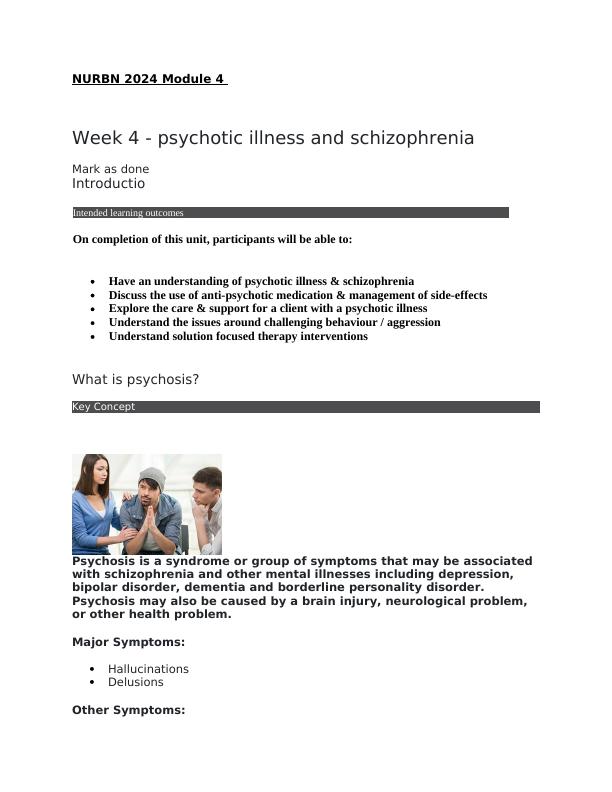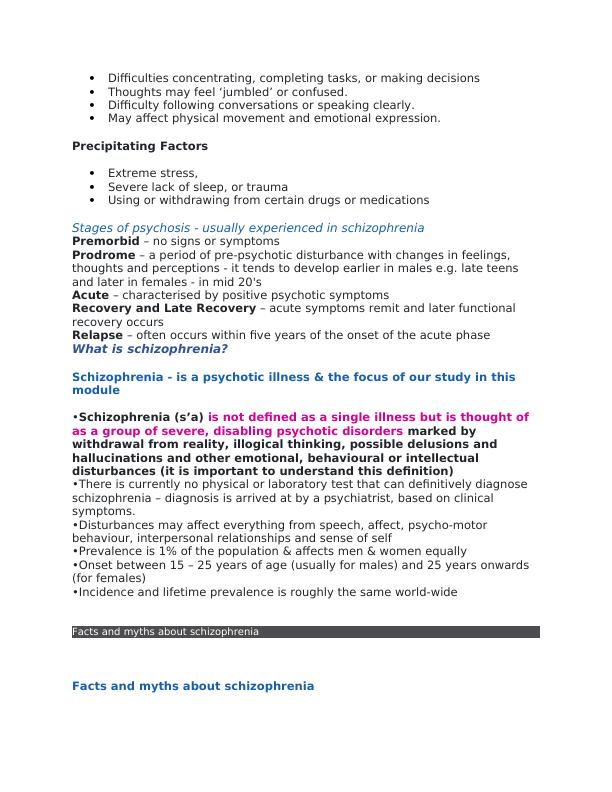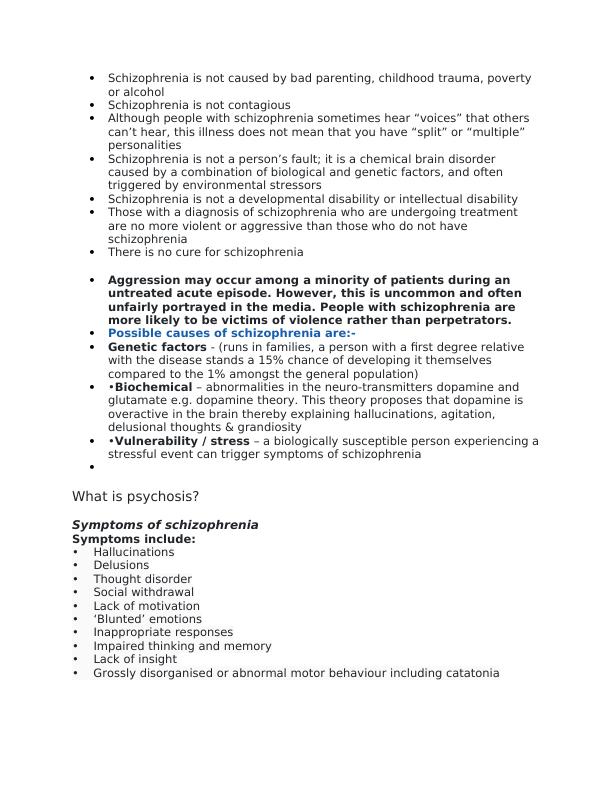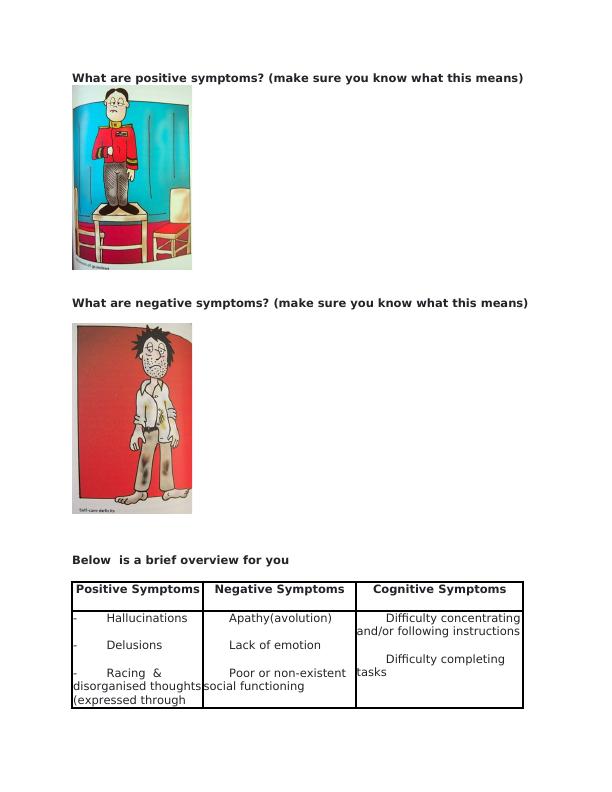NURBN Psychotic Illness and Schizophrenia Assessment 2022
Added on 2022-09-06
14 Pages2744 Words17 Views
NURBN 2024 Module 4
Week 4 - psychotic illness and schizophrenia
Mark as done
Introductio
Intended learning outcomes
On completion of this unit, participants will be able to:
Have an understanding of psychotic illness & schizophrenia
Discuss the use of anti-psychotic medication & management of side-effects
Explore the care & support for a client with a psychotic illness
Understand the issues around challenging behaviour / aggression
Understand solution focused therapy interventions
What is psychosis?
Key Concept
Psychosis is a syndrome or group of symptoms that may be associated
with schizophrenia and other mental illnesses including depression,
bipolar disorder, dementia and borderline personality disorder.
Psychosis may also be caused by a brain injury, neurological problem,
or other health problem.
Major Symptoms:
Hallucinations
Delusions
Other Symptoms:
Week 4 - psychotic illness and schizophrenia
Mark as done
Introductio
Intended learning outcomes
On completion of this unit, participants will be able to:
Have an understanding of psychotic illness & schizophrenia
Discuss the use of anti-psychotic medication & management of side-effects
Explore the care & support for a client with a psychotic illness
Understand the issues around challenging behaviour / aggression
Understand solution focused therapy interventions
What is psychosis?
Key Concept
Psychosis is a syndrome or group of symptoms that may be associated
with schizophrenia and other mental illnesses including depression,
bipolar disorder, dementia and borderline personality disorder.
Psychosis may also be caused by a brain injury, neurological problem,
or other health problem.
Major Symptoms:
Hallucinations
Delusions
Other Symptoms:

Difficulties concentrating, completing tasks, or making decisions
Thoughts may feel ‘jumbled’ or confused.
Difficulty following conversations or speaking clearly.
May affect physical movement and emotional expression.
Precipitating Factors
Extreme stress,
Severe lack of sleep, or trauma
Using or withdrawing from certain drugs or medications
Stages of psychosis - usually experienced in schizophrenia
Premorbid – no signs or symptoms
Prodrome – a period of pre-psychotic disturbance with changes in feelings,
thoughts and perceptions - it tends to develop earlier in males e.g. late teens
and later in females - in mid 20's
Acute – characterised by positive psychotic symptoms
Recovery and Late Recovery – acute symptoms remit and later functional
recovery occurs
Relapse – often occurs within five years of the onset of the acute phase
What is schizophrenia?
Schizophrenia - is a psychotic illness & the focus of our study in this
module
•Schizophrenia (s’a) is not defined as a single illness but is thought of
as a group of severe, disabling psychotic disorders marked by
withdrawal from reality, illogical thinking, possible delusions and
hallucinations and other emotional, behavioural or intellectual
disturbances (it is important to understand this definition)
•There is currently no physical or laboratory test that can definitively diagnose
schizophrenia – diagnosis is arrived at by a psychiatrist, based on clinical
symptoms.
•Disturbances may affect everything from speech, affect, psycho-motor
behaviour, interpersonal relationships and sense of self
•Prevalence is 1% of the population & affects men & women equally
•Onset between 15 – 25 years of age (usually for males) and 25 years onwards
(for females)
•Incidence and lifetime prevalence is roughly the same world-wide
Facts and myths about schizophrenia
Facts and myths about schizophrenia
Thoughts may feel ‘jumbled’ or confused.
Difficulty following conversations or speaking clearly.
May affect physical movement and emotional expression.
Precipitating Factors
Extreme stress,
Severe lack of sleep, or trauma
Using or withdrawing from certain drugs or medications
Stages of psychosis - usually experienced in schizophrenia
Premorbid – no signs or symptoms
Prodrome – a period of pre-psychotic disturbance with changes in feelings,
thoughts and perceptions - it tends to develop earlier in males e.g. late teens
and later in females - in mid 20's
Acute – characterised by positive psychotic symptoms
Recovery and Late Recovery – acute symptoms remit and later functional
recovery occurs
Relapse – often occurs within five years of the onset of the acute phase
What is schizophrenia?
Schizophrenia - is a psychotic illness & the focus of our study in this
module
•Schizophrenia (s’a) is not defined as a single illness but is thought of
as a group of severe, disabling psychotic disorders marked by
withdrawal from reality, illogical thinking, possible delusions and
hallucinations and other emotional, behavioural or intellectual
disturbances (it is important to understand this definition)
•There is currently no physical or laboratory test that can definitively diagnose
schizophrenia – diagnosis is arrived at by a psychiatrist, based on clinical
symptoms.
•Disturbances may affect everything from speech, affect, psycho-motor
behaviour, interpersonal relationships and sense of self
•Prevalence is 1% of the population & affects men & women equally
•Onset between 15 – 25 years of age (usually for males) and 25 years onwards
(for females)
•Incidence and lifetime prevalence is roughly the same world-wide
Facts and myths about schizophrenia
Facts and myths about schizophrenia

Schizophrenia is not caused by bad parenting, childhood trauma, poverty
or alcohol
Schizophrenia is not contagious
Although people with schizophrenia sometimes hear “voices” that others
can’t hear, this illness does not mean that you have “split” or “multiple”
personalities
Schizophrenia is not a person’s fault; it is a chemical brain disorder
caused by a combination of biological and genetic factors, and often
triggered by environmental stressors
Schizophrenia is not a developmental disability or intellectual disability
Those with a diagnosis of schizophrenia who are undergoing treatment
are no more violent or aggressive than those who do not have
schizophrenia
There is no cure for schizophrenia
Aggression may occur among a minority of patients during an
untreated acute episode. However, this is uncommon and often
unfairly portrayed in the media. People with schizophrenia are
more likely to be victims of violence rather than perpetrators.
Possible causes of schizophrenia are:-
Genetic factors - (runs in families, a person with a first degree relative
with the disease stands a 15% chance of developing it themselves
compared to the 1% amongst the general population)
•Biochemical – abnormalities in the neuro-transmitters dopamine and
glutamate e.g. dopamine theory. This theory proposes that dopamine is
overactive in the brain thereby explaining hallucinations, agitation,
delusional thoughts & grandiosity
•Vulnerability / stress – a biologically susceptible person experiencing a
stressful event can trigger symptoms of schizophrenia
What is psychosis?
Symptoms of schizophrenia
Symptoms include:
• Hallucinations
• Delusions
• Thought disorder
• Social withdrawal
• Lack of motivation
• ‘Blunted’ emotions
• Inappropriate responses
• Impaired thinking and memory
• Lack of insight
• Grossly disorganised or abnormal motor behaviour including catatonia
or alcohol
Schizophrenia is not contagious
Although people with schizophrenia sometimes hear “voices” that others
can’t hear, this illness does not mean that you have “split” or “multiple”
personalities
Schizophrenia is not a person’s fault; it is a chemical brain disorder
caused by a combination of biological and genetic factors, and often
triggered by environmental stressors
Schizophrenia is not a developmental disability or intellectual disability
Those with a diagnosis of schizophrenia who are undergoing treatment
are no more violent or aggressive than those who do not have
schizophrenia
There is no cure for schizophrenia
Aggression may occur among a minority of patients during an
untreated acute episode. However, this is uncommon and often
unfairly portrayed in the media. People with schizophrenia are
more likely to be victims of violence rather than perpetrators.
Possible causes of schizophrenia are:-
Genetic factors - (runs in families, a person with a first degree relative
with the disease stands a 15% chance of developing it themselves
compared to the 1% amongst the general population)
•Biochemical – abnormalities in the neuro-transmitters dopamine and
glutamate e.g. dopamine theory. This theory proposes that dopamine is
overactive in the brain thereby explaining hallucinations, agitation,
delusional thoughts & grandiosity
•Vulnerability / stress – a biologically susceptible person experiencing a
stressful event can trigger symptoms of schizophrenia
What is psychosis?
Symptoms of schizophrenia
Symptoms include:
• Hallucinations
• Delusions
• Thought disorder
• Social withdrawal
• Lack of motivation
• ‘Blunted’ emotions
• Inappropriate responses
• Impaired thinking and memory
• Lack of insight
• Grossly disorganised or abnormal motor behaviour including catatonia

What are positive symptoms? (make sure you know what this means)
What are negative symptoms? (make sure you know what this means)
Below is a brief overview for you
Positive Symptoms Negative Symptoms Cognitive Symptoms
- Hallucinations
- Delusions
- Racing &
disorganised thoughts
(expressed through
Apathy(avolution)
Lack of emotion
Poor or non-existent
social functioning
Difficulty concentrating
and/or following instructions
Difficulty completing
tasks
What are negative symptoms? (make sure you know what this means)
Below is a brief overview for you
Positive Symptoms Negative Symptoms Cognitive Symptoms
- Hallucinations
- Delusions
- Racing &
disorganised thoughts
(expressed through
Apathy(avolution)
Lack of emotion
Poor or non-existent
social functioning
Difficulty concentrating
and/or following instructions
Difficulty completing
tasks

End of preview
Want to access all the pages? Upload your documents or become a member.
Related Documents
Acute Mental Illness : Case Study Assignment.lg...
|10
|3352
|11
Understanding Mental Health Issues: Symptoms, Causes and Treatmentlg...
|20
|6206
|85
Stereotyping of People Living with Schizophrenialg...
|10
|3114
|493
Schizophrenia: Symptoms, Prevalence, and Treatmentlg...
|13
|3200
|118
The impact of psychosis disorder on human healthlg...
|8
|1370
|428
Mental Health and Schizophrenia in Criminal Justicelg...
|7
|1490
|358